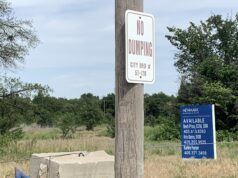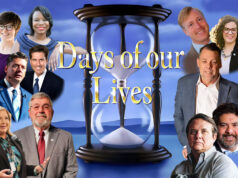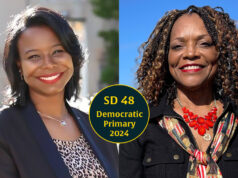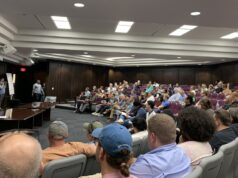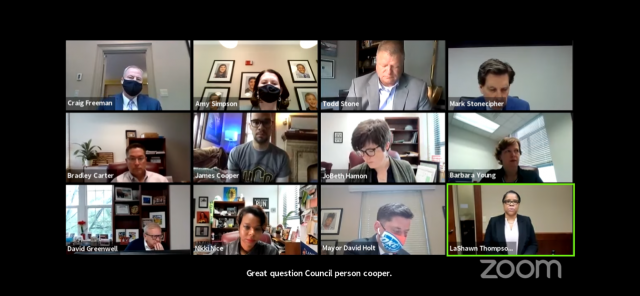
An annual springtime ritual began Tuesday as the OKC City Council received the proposed Fiscal Year 2022 budget from several city departments.
At $1.6 billion, the budget proposed is 2.4 percent smaller than the current one, owing to declining balances in the MAPS 3 and Better Streets, Safer City temporary sales tax funds as those programs end.
Meanwhile, the city’s general fund is expected to grow by about 6.8 percent, to about $496 million, as the economy continues its recovery from the COVID-19 pandemic.
In the wake of several high profile shootings by local police officers and a national climate of increased calls for police accountability following the death of George Floyd in 2020, the police segment of the budget overview received plenty of attention from city councilors.
The budget presentations will continue on May 18 and June 1. The council is expected to vote on the 2022 budget on June 8.
Gourley presents police budget
The total 2022 budget for the city’s police department is $227,731,144. That total represents an increase of about $1.3 million over the previous budget.
Oklahoma City Police Chief Wade Gourley gave a presentation that highlighted some of the items that would change in the proposed budget. Those included restoring 34 budgeted positions that had been frozen in last year’s budget, including six non-officer positions that were eliminated in the 2021 budget as well as hiring three new civilian crime-scene investigators. Additionally, the department would hire an administrative coordinator to handle purchasing and a full-time data analyst.
“Restoring these positions will help us get to full strength and help us do as much as we can to police this large community,” Gourley said.
Gourley also highlighted plans for enhanced simulated training through the department’s reality-based training unit, which presents officers with real-life situations they might encounter in the field. Gourley said part of that training would include crisis intervention.
“These officers participate in training that includes a broad range of outcomes,” Gourley said.
The department’s media-relations office would also be expanded under the new budget, Gourley said.
Police department staffing discussed
Ward 8 councilman Mark Stonecipher asked Gourley about the current staffing levels at the department. Gourley said the department is well below its recommended officer levels, according to a study released in 2012.
“The one thing that concerns me is you used the term ‘understaffed,'” Stonecipher said. “I know we did a third-party consulting report that looked at whether our police department was understaffed. At that time, they found we needed an additional 142 officers, and every year after that we should hire another 35 officers. I don’t think we’re getting there.”
Gourley said similar-sized cities have more officers. Currently, the department has 1,556 sworn officers.
“If you look at cities that are pretty comparable to us — like Fort Worth (and) Kansas City, Missouri, are the ones I look at — they all have more officers, even though they have smaller land size,” Gourley said. “If you look at the budget and what we’re trying to do, one of the big things we’re trying to do is do more than less. As a team, if we increase our non-sworn staff doing functions normally a sworn officer would do, that allows us to put that officer back on the street.”
Council members question training, recruiting
While Gourley’s budget calls for increased training, it does not include training for all officers, something Ward 2 Councilman James Cooper said Tuesday he would like to see. It’s unclear how many of the department’s more than 1,500 sworn officers would receive the training.
Ward 6 Councilwoman JoBeth Hamon said some calls officers respond to could require training even if they’re not specific to mental health issues.
“Every day people are in crisis even if the call isn’t specifically a crisis call,” Hamon said. “That’s where I think with Councilman (James) Cooper’s resolution of 100 percent, I want to re-introduce the idea that I spoke about last year, that if you’re responding to a domestic violence call, that is a mental health crisis. If you have folks who are in a traffic collision, those folks are in a mental health crisis. I want to re-emphasize the idea that mental health calls, sure there are some that are specific to someone having a diagnosis, but crisis intervention needs to be something across all disciplines.”
Ward 7 Councilwoman Nikki Nice asked Gourley about recruitment efforts, specifically for minority officers.
“Diversity has really been a concern for me when you look at past recruit classes,” Nice said.
Gourley said those efforts are ongoing, but increasingly difficult.
“We work very hard on our recruiting,” Gourley said. “We have recruiters who are constantly going out into the community. It is challenging times right now. Not only within the city but all over the country because of the negative stigma that are targeting law enforcement. We have more people who are leaving and less people applying for the job.”










